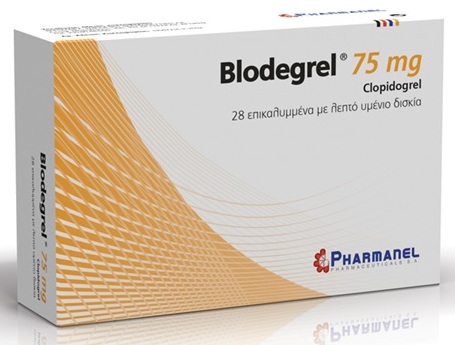Blodegrel

Prevention of atherothrombotic events in: Recent MI, Recent Stroke or Established Peripheral Arterial Disease: For patients with a history of recent myocardial infarction (MI), recent stroke, or established peripheral arterial disease, Blodegrel has been shown to reduce the rate of a combined endpoint of new ischemic stroke (fatal or not), new MI (fatal or not), and other vascular death.
Acute Coronary Syndrome: For patients with non-ST-segment elevation acute coronary syndrome (unstable angina/non-Q-wave MI) including patients who are to be managed medically and those who are to be managed with percutaneous coronary intervention (with or without stent) or coronary artery bypass graft (CABG), Blodegrel has been shown to decrease the rate of a combined endpoint of cardiovascular death, MI or stroke as well as the rate of a combined endpoint of cardiovascular death, MI, stroke or refractory ischemia.
For patients with ST-segment elevation acute MI, Blodegrel has been shown to reduce the rate of death from any cause and the rate of a combined endpoint of death, reinfarction or stroke.
Atrial Fibrillation: In patients with atrial fibrillation (AF) at increased risk of vascular events who can take vitamin K antagonist (VKA) therapy, VKA has been shown to be associated with a better clinical benefit than acetylsalicylic acid (aspirin) alone or the combination of Blodegrel and aspirin for the reduction of stroke.
In patients with atrial fibrillation who have at least 1 risk factor for vascular events and who cannot take VKA therapy [eg, specific risk of bleeding, physician assessment that patient is unable to comply with international normalized ratio (INR) monitoring or that VKA use is inappropriate], Blodegrel is indicated in combination with aspirin for the prevention of atherothrombotic and thromboembolic events, including stroke. Blodegrel in combination with aspirin has been shown to reduce the rate of the combined endpoint of stroke, myocardial infarction (MI), non-CNS systemic embolism, or vascular death, largely through a reduction in stroke.
HOW SHOULD I USE BLODEGREL?
Use Blodegrel as directed by your doctor. Check the label on the medicine for exact dosing instructions.
Take Blodegrel by mouth with or without food.
Take Blodegrel on a regular schedule to get the most benefit from it.
Do not stop taking Blodegrel without talking to your doctor. This may increase the risk of heart problems.
If you miss a dose of Blodegrel, take it as soon as possible. If it is almost time for your next dose, skip the missed dose and go back to your regular dosing schedule. Do not take 2 doses at once.
Ask your health care provider any questions you may have about how to use Blodegrel.
More: https://www.ndrugs.com/?s=blodegrel
